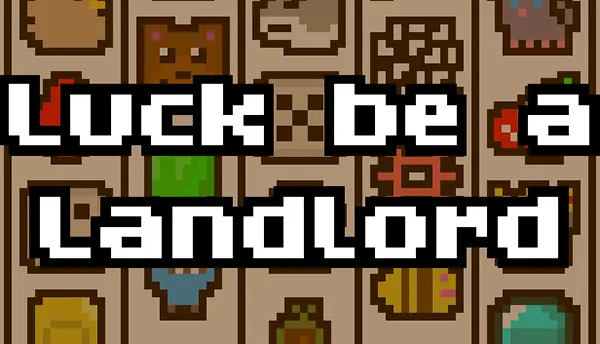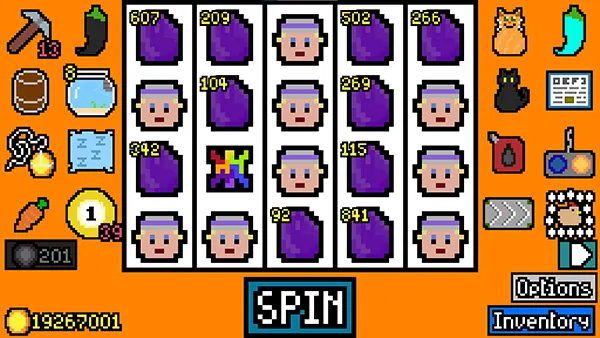
Luck Be a Landlord: an Indie Slot with Roguelike Style and Unique Combo Strategy
Luck Be a Landlord is a distinctive indie game that merges the mechanics of classic slots with the depth and unpredictability of roguelike design. Released by developer TrampolineTales, this title offers a compelling mix of strategy, randomness, and planning. As of June 2025, it remains relevant thanks to regular updates and a dedicated player community that values its tactical richness.
Gameplay Mechanics: What Makes It Stand Out
The core loop of the game revolves around spinning a virtual slot machine to collect coins and pay rent. However, unlike traditional slots, the symbols represent interactive elements, each with unique behaviours and synergies. This transforms what would be a luck-based experience into a deep, strategic puzzle.
After each spin, players can choose new symbols to add to their board, gradually building combinations that generate greater returns. For example, cats synergise with milk, flowers benefit from adjacent bees, and dwarves profit more from beer. These interactions add layers of decision-making that go beyond simple chance.
Importantly, symbols do not disappear after being triggered. They remain on the board, allowing players to build long-term strategies across multiple spins. This persistence creates a sense of progress and investment in every decision made, encouraging thoughtful, tactical play.
The Influence of Roguelike Elements
Each playthrough starts from scratch, following the roguelike tradition. The symbols offered, the items available, and the sequence of rents due are all procedurally generated. This ensures no two games are the same, and players must adapt continuously to changing conditions.
Item drops and symbol availability vary randomly, adding unpredictability and rewarding experimentation. The game encourages players to think on their feet and try new builds based on what they receive — a hallmark of roguelike strategy design.
This randomness doesn’t equate to chaos. Instead, it fosters replayability, as players refine their understanding of synergies and learn to identify powerful combinations early in a run. Adaptability becomes key, and decision-making is always central.
Strategic Depth and Synergy Building
At its heart, Luck Be a Landlord is a strategy game. Players must balance short-term income with long-term development, optimising board space and symbol choice. Some combinations are lucrative but take time to establish, while others offer quick returns but limit scalability.
Symbol interactions form the backbone of success. Recognising these interactions — such as rabbits boosting the value of adjacent carrots or the effect of specific items on entire symbol categories — is essential. The game rewards players who plan not just the next move, but several ahead.
Items play a pivotal role in amplifying symbol performance. From passive income boosters to modifiers that alter symbol behaviour, choosing the right items can make or break a run. Understanding how items complement symbol builds is one of the deeper layers of the game’s design.
Board Management and Optimisation
The game limits players to 20 active symbols at a time, which forces difficult decisions. Knowing when to remove underperforming symbols or decline tempting but unfit offers is part of mastering the board. Precision and discipline often yield better outcomes than chasing flashy effects.
Curating a streamlined, efficient board allows more consistent synergies and predictable earnings. Overloading the slot with too many unrelated symbols can dilute results, making it harder to meet rising rent demands.
Players who succeed often treat the board like a resource management system, pruning excess and doubling down on key strategies. It’s a rewarding process that turns a seemingly simple game into a mental challenge.

Progression, Unlocks, and Community Support
Although each run starts anew, the game includes meta-progression elements. Completing challenges unlocks new symbols and items, expanding strategic options for future playthroughs. This adds a sense of growth over time, even when individual runs fail.
The developer continues to support the game with balance updates, quality-of-life improvements, and community-driven suggestions. As of mid-2025, the player base remains active, and the game is frequently recommended among fans of indie strategy titles.
Its minimalist art and simple interface hide a wealth of complexity. That accessibility, combined with its depth, has cemented Luck Be a Landlord as a standout entry in the hybrid slot-roguelike genre — one that rewards curiosity, patience, and smart planning.
The Role of Feedback and Iteration
Community feedback has played a major role in shaping the game. Frequent discussions on forums and updates from the developer reflect a collaborative approach to ongoing improvement. Suggestions from veteran players often find their way into patches and tweaks.
This dynamic keeps the experience fresh and ensures a balance between challenge and fairness. New players can jump in without overwhelming difficulty, while veterans can explore intricate builds and seek high-score optimisation.
It’s a living game, constantly evolving, and that responsiveness is part of what keeps the player base engaged years after release. As the genre expands, Luck Be a Landlord remains a benchmark for creativity in design and community-focused development.
